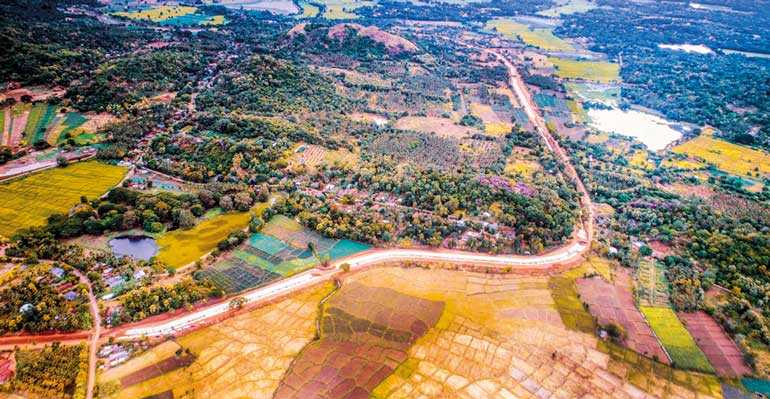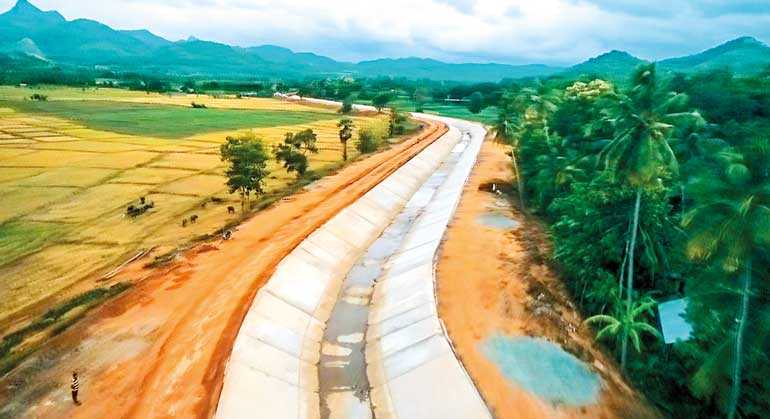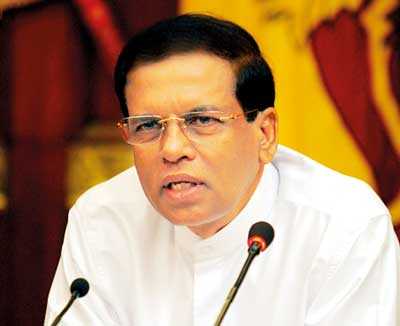Sunday Feb 15, 2026
Sunday Feb 15, 2026
Thursday, 23 August 2018 00:00 - - {{hitsCtrl.values.hits}}
 A bird’s-eye view of 65 km-long Wayamba Ela, which will carry 130 million m3 of water to the North Western Province to ensure cultivation of parched lands in Wayamba in both Yala and Maha seasons – Pix by Sudath J Silva
A bird’s-eye view of 65 km-long Wayamba Ela, which will carry 130 million m3 of water to the North Western Province to ensure cultivation of parched lands in Wayamba in both Yala and Maha seasons – Pix by Sudath J Silva

President Maithripala Sirisena on Tuesday assured that there was no cash crunch in the Government, nor lack of support from multilateral donors to fund much-needed and multi-faceted development projects.
This declaration by President Sirisena was during a meeting with editors and heads of electronic media, to announce the launch of the second phase of the Rs. 23 billion worth Moragahakanda-Kaluganga reservoir tomorrow in the North-Western Province. 
In response to a query from the media whether the Government has enough resources to finance and complete such large scale projects, given the perceived cash crunch within the Treasury, the President reassured that this wasn’t an issue.
“For development, we have money,” asserted President Sirisena, and added that the Moragahakanda-Kaluganga reservoir project has received funding from the Asian Development Bank, World Bank, China, OPEC fund, Kuwait, Saudi Arabia, and Japan among others.
He said that funding for this and other development projects were long-term and concessionary. It was emphasised that these projects benefits a plethora of socio-economic sectors.
The construction of the Moragahakanda-Kaluganga reservoir is the largest multi-purpose development project in Sri Lanka, completed spending Rs. 23 billion.
As part of the project is to provide safe drinking water, as well as supplying water for irrigation for those in the North-Western Province via the Matale-Kurunegala link, the launch of second phase tomorrow will enable irrigation of 12,500 hectares and the development of eight large-scale tanks and 353 small-scale tanks. The project will provide direct dividends to 13,500 farmer families, and indirect benefits to another 80,000 farmer families.
At present, a mega development project is being implemented to fulfil the water needs of the people in the Wayamba Province, ending a long-term water shortage, under the guidance of President Sirisena.
Even though various irrigation projects were implemented in the country, the people living in the Wayamba Province faced many difficulties, as all the Government’s power failed to provide a solution for their water issue. The living standard of the people in the region decreased as the farmers suffered from a severe shortage of water for their cultivation activities, and the clean drinking water shortage led to the proliferation of kidney diseases in the region.
In 2016, the Wayamba Ela project launched under the guidance of the President, with the aim of providing a solution for the shortage of water for irrigation of cultivation lands in both seasons, without any shortage.
The second phase also involves moving water from the Mahaweli River of the Eastern province towards the Northern region. The surplus water of Nalanda reservoir is being turned towards Wamadilla reservoir. Under the first stage, it is expected to provide infrastructure to carry this water towards the Wamadilla project and Devahuwa reservoir, and to carry water of the Mahaweli Canal and the Nalanda reservoir to the Kurunegala district.
Under the second stage, it is expected to build facilities and infrastructure to construct canals to channel water from the Kurunegala district towards the small river systems of Polpithigama, Ahatuwewa, Galgamuwa and Mahawa, to send the water of the Mahaweli River carried towards Bowaththenna reservoir towards Dambululu Oya, and to channel this water towards the canal systems built in the first stage.
Under the mega plan to renovate 2400 tanks in the rural areas under the Ellanga system, the reconstruction of 353 tanks of the North-Western province will also commence under the patronage of the President.
Thus, 91 tanks of Ahatuwewa Divisional Secretariat, 119 tanks of Polpithigama Divisional Secretariat, 107 tanks of Mahawa Divisional Secretariat, 30 tanks of Galewela Divisional Secretariat, one tank at Palagala Divisional Secretariat and 5 tanks in Dambulla Divisional Secretariat will be developed.